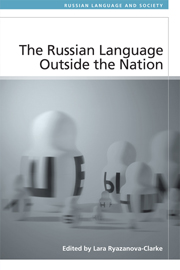Book contents
- Frontmatter
- Contents
- Notes on Contributors
- Cyrillic Transliteration System Adopted in the Book
- Introduction: The Russian Language, Challenged by Globalisation
- PART I Russian and Its Legal Status
- PART II Linguistic Perceptions and Symbolic Values
- 3 The Russian Language in Belarus: Language Use, Speaker Identities and Metalinguistic Discourse
- 4 What is Russian in Ukraine? Popular Beliefs Regarding the Social Roles of the Language
- PART III Russian-Speaking Communities and Identity Negotiations
- PART IV Language Contact and the Globalisation of Russian
- PART V Globalisation of Russian as Soft Power
- Index
3 - The Russian Language in Belarus: Language Use, Speaker Identities and Metalinguistic Discourse
from PART II - Linguistic Perceptions and Symbolic Values
Published online by Cambridge University Press: 05 September 2014
- Frontmatter
- Contents
- Notes on Contributors
- Cyrillic Transliteration System Adopted in the Book
- Introduction: The Russian Language, Challenged by Globalisation
- PART I Russian and Its Legal Status
- PART II Linguistic Perceptions and Symbolic Values
- 3 The Russian Language in Belarus: Language Use, Speaker Identities and Metalinguistic Discourse
- 4 What is Russian in Ukraine? Popular Beliefs Regarding the Social Roles of the Language
- PART III Russian-Speaking Communities and Identity Negotiations
- PART IV Language Contact and the Globalisation of Russian
- PART V Globalisation of Russian as Soft Power
- Index
Summary
INTRODUCTION
Belarus is widely regarded as the most ‘Russified’ of the former Soviet republics, and indeed nowhere beyond the borders of the Russian Federation has the Russian language retained such a dominant position in virtually all spheres of public life. While modest efforts were made in the first years of independence to promote the use of Belarusian in education, the media and government, since the 1995 referendum that granted Russian co-official status with Belarusian the latter has found itself increasingly marginalised. The continued dominance of the Russian language in Belarus does not, however, to the surprise of those who adhere to essentialist notions regarding the relationship between language and national identity, translate into a readiness on the part of most Belarusians to self-identify as Russians and seek their country's annexation by its eastern neighbour. Although the ideas of restoring the USSR and/or pursuing political union with Russia had a significant following in Belarus in the mid-1990s, and were indeed among the factors contributing to the rise of Belarusian president Aleksandr Lukashenko, recent public opinion polls show a steadily declining level of support for a Belarus–Russia union state, which according to some recent public opinion surveys falls to just around 10–12 per cent when unification is explicitly defined as Belarus joining the Russian Federation and abandoning its own national institutions (IISEPS 2008).
Information
- Type
- Chapter
- Information
- The Russian Language Outside the Nation , pp. 81 - 116Publisher: Edinburgh University PressPrint publication year: 2014
